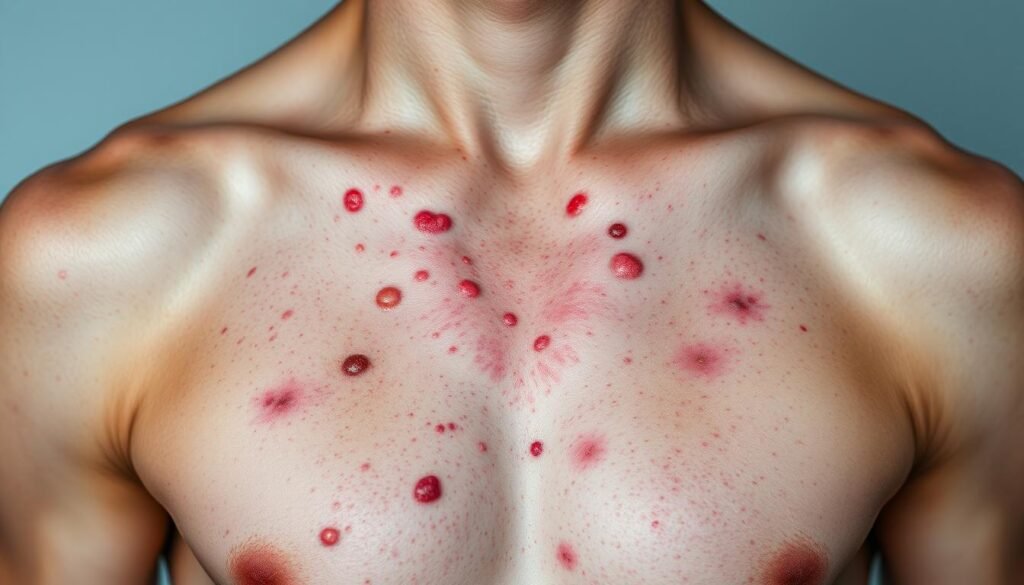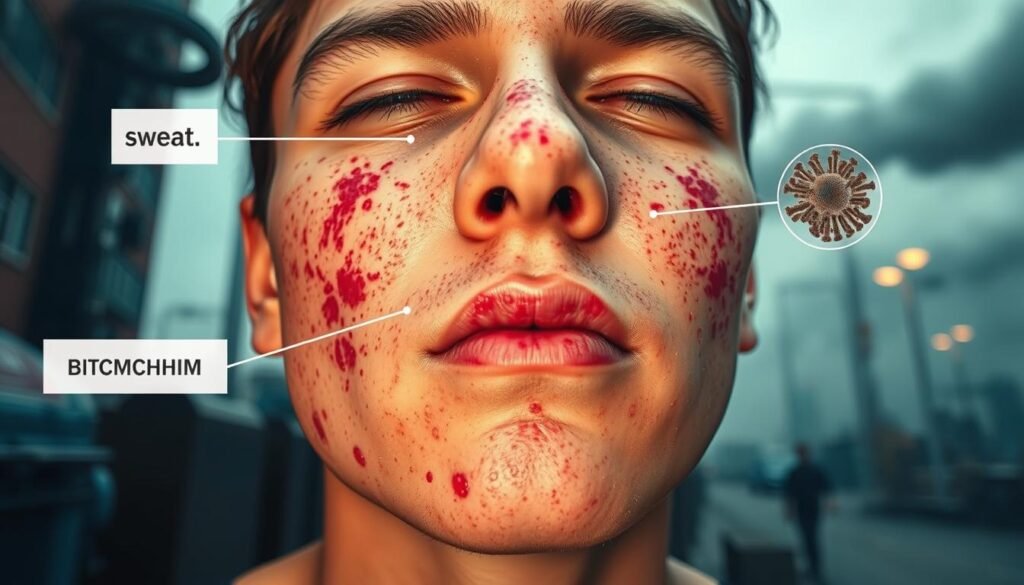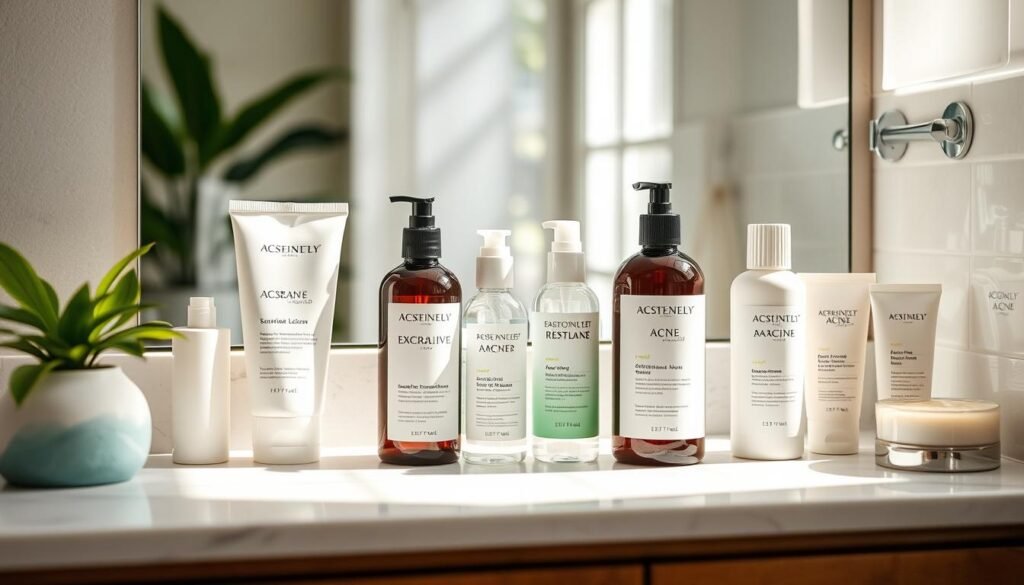About 50 million Americans deal with acne every year. For many, body acne is a major concern. It’s often caused by things we do every day. Adults and teenagers alike find pimples not just on their faces but also on their back, shoulders, and chest.
Why does body acne happen? A lot has to do with hormones, what you eat, and how stressed you feel. Knowing what triggers your acne is key to stop it. Thankfully, there are treatments available, like benzoyl peroxide. It’s time to bring attention to this widespread issue and the ways to fight it. Lifestyle changes can lead to clearer skin.
Key Takeaways
- Around 50 million Americans face acne annually, including body acne.
- Hormonal imbalances, diet, and stress can trigger body acne.
- Maintaining proper hygiene is vital to preventing body breakouts.
- Over-the-counter treatments should be used consistently for several weeks.
- Identifying the type of body acne is essential for effective treatment.
Understanding Body Acne
About 10% of people get body acne. It usually shows up where we have a lot of oil glands. Places like the back, chest, and shoulders. Oil, dead skin, and bacteria clog the hair follicles causing this acne. Though we often think it’s just for teens, adults get it too. This makes it important to talk about.
Some get a mild type called acne cosmetica from certain beauty or hair products. This type mainly hits the neck and hairline. It’s tough for those dealing with it. Then there’s acne mechanica, caused by tight clothes or gear rubbing the skin. It irritates the hair follicles.
To manage body acne, know what triggers it. Things like hormone changes, genetics, and what you eat play a role. Eating less sugar and dairy might help cut down on breakouts. If body acne is bad, a skin doctor can suggest strong treatments. Like special gels or washes.
Taking good care of your skin matters a lot. Shower after doing sports and use acne-friendly washes. Go easy when cleaning your skin. And pick body care items that won’t clog pores. Living a healthy lifestyle helps prevent acne flare-ups too.
| Factor | Details |
|---|---|
| Common Areas | Back, chest, neck, shoulders, upper arms |
| Triggers | Hormonal changes, excess dead skin cells, sebaceous gland activity, acne-causing bacteria |
| Acne Types | Acne cosmetica, acne mechanica |
| Treatment Options | Over-the-counter benzoyl peroxide, salicylic acid, topical retinoids, prescription treatments |
What Causes Body Acne: Common Triggers
Body acne has many causes. Knowing what triggers them is key. Hormones, especially during puberty or periods, can raise oil production, causing acne. These changes are often tied to testosterone in teens and significant times in women’s lives, like pregnancy and menopause.
Hormonal Changes and Body Acne
Puberty makes testosterone levels rise, leading to more acne. Women might get adult acne from hormonal swings during periods or from conditions like polycystic ovary syndrome. These hormone shifts are big factors in body acne.
The Role of Diet in Body Acne
What you eat can affect acne. Studies show that sugar and dairy might make acne worse. High glycemic foods can boost insulin, making the body produce more oil and causing acne. Eating balanced meals helps manage body acne.
Stress as a Contributing Factor
Stress plays a big role in causing acne. It can lead to hormonal changes that make acne more likely. It’s important to manage stress with relaxation and healthy ways to cope for better skin health.
The Impact of Lifestyle Choices on Body Acne
Lifestyle choices are key to either increasing or managing body acne. Smoking, drinking, and how much we move can all affect our skin. Knowing how these factors impact skin can guide us toward better choices for clearer skin.
Smoking and Alcohol Consumption
Smoking and heavy drinking harm our skin, leading to acne. Cigarettes contain toxins that lower blood flow and boost inflammation. This makes skin conditions worse and hard to treat. On the other hand, alcohol dries out the skin, making it prone to acne.
Physical Activity and Its Effects
Staying active is great for both overall health and keeping skin clear. It cuts stress, leading to less cortisol, a contributor to acne. However, sweat and germs from exercise can cause acne if you’re not careful. After working out, it’s important to shower and wear fresh clothes to prevent acne.
| Lifestyle Factor | Impact on Skin |
|---|---|
| Smoking | Reduces blood circulation; increases inflammation |
| Alcohol | Dehydrates skin; exacerbates acne |
| Exercise | Reduces stress; cleanses skin through sweat |
| Hygiene Practices | Prevents bacteria build-up; reduces risk of breakouts |
Types of Body Acne: Back, Chest, and More
Body acne comes in different forms like back and chest acne. Learning about them helps in finding good treatments. Back acne, or bacne, can make you feel uncomfortable and self-aware. Knowing what causes these can help stop them from getting worse.
Back Acne (Bacne): Causes and Symptoms
Back acne happens when oil, sweat, and dead skin block hair follicles. Wearing tight clothes during exercise can make it worse. So can using sports gear. The symptoms include red bumps, cysts, and sometimes tender pustules. Using cleansers with salicylic acid can clean these areas by removing oil and dirt.
Chest Acne: What You Need to Know
Chest acne comes from the same issues that cause back acne. Things like hormonal changes in teens and women can lead to it. You might see blackheads, whiteheads, and cysts. Using lotions that don’t clog pores and gentle washes can help. Staying hydrated and clean also helps with chest acne.

To learn more about chest acne and how to manage it, check out this link. Using breathable clothes and avoiding strong laundry soap can also help your skin. Knowing about these types of acne is key for those who want clear skin.
How Clogged Pores Lead to Body Breakouts
Clogged pores are a big reason behind body breakouts. When too much oil, dirt, and dead skin pile up in hair follicles, they block the pores. This mostly happens in areas with lots of sebaceous glands, like the back, chest, and arms. If these follicles stay clogged, blackheads or whiteheads can form. Over time, these can turn into painful pimples because of bacterial growth.
People prone to acne often struggle more during hormonal changes. These changes can make the body produce more oil. Factors like changing hormone levels, stress, and even what you eat can make this worse. Understanding this link shows why it’s crucial to have a good skincare routine to avoid body breakouts.
To keep pores from getting clogged, several steps can help. Using body washes with salicylic acid or benzoyl peroxide helps keep pores open. Also, it’s important to wash off sweat and wear clothes that don’t hug the skin too tightly. Taking these steps can really help keep your skin healthy and lower the chance of acne.
Skin Irritation and Its Relationship with Body Acne
Skin irritation is key in causing body acne. Things like humidity, pollution, and sun can irritate the skin. This makes acne worse. Knowing about these can help control and lessen acne.
Environmental Factors
Environment plays a big role in skin irritation. High humidity makes you sweat. This can block pores and make acne worse. Pollution puts harmful stuff on your skin, causing irritation. Also, too much sun dries out your skin. This can also lead to breakouts. Handling these factors is crucial for skin health.
Clothing and Fabric Choices
The clothes you wear affect your skin a lot. Tight, synthetic clothes can rub your skin the wrong way. This causes irritation and acne. Choosing loose, natural fabrics can fix this problem. Understanding this helps you pick clothes that are kind to your skin.

Tackling both environmental issues and clothing choices can improve your skin. Knowing these factors is the basis for good acne care. For more acne advice, look at resources like Cleveland Clinic.
Identifying Acne Mechanica and Acne Cosmetica
Acne mechanica and acne cosmetica are two common acne types caused by outside factors. Acne mechanica comes from friction or pressure on your skin. This is common in athletes who wear tight gear. It often happens because of too much *sebum*, sweat, and bacteria. These things block pores due to constant rubbing.
On the other hand, acne cosmetica is caused by comedogenic cosmetics. These makeup products can block your pores and cause acne. By understanding these acne types, you can prevent and treat them effectively. This way, you tackle the main causes directly.
To tell acne mechanica and acne cosmetica apart, here’s what to consider:
| Acne Type | Causes | Common Areas | Prevention Strategies |
|---|---|---|---|
| Acne Mechanica | Friction, pressure | Face, back, chest | Wear loose clothing, maintain proper hygiene |
| Acne Cosmetica | Comedogenic products | Face, neck | Use non-comedogenic makeup, cleanse skin thoroughly |
Knowing how to spot these conditions helps you choose the right products and care routines. Getting to know how to identify acne types lets you stop outbreaks and keep your skin clear.
Effective Solutions to Combat Body Acne
To manage body acne, adopting tailored solutions is key. You need to adjust your skincare and use specific acne treatments. This can greatly improve your skin’s health.
Skincare Routine Adjustments
Using non-comedogenic products is crucial to prevent breakouts. Your daily routine should include gentle cleansing and exfoliating. This keeps the skin from getting irritated.
Using body washes with salicylic acid can cut down oil and tackle whiteheads. Benzoyl peroxide products help dry out pimples and stop new ones.
Topical Treatments: Salicylic Acid and Benzoyl Peroxide
Topical treatments are vital for body acne. Products with up to 2% salicylic acid work well. Benzoyl peroxide comes in forms with up to 10% concentration.
For sensitive skin, choose lower strengths to reduce irritation. Adding these to your routine can show improvements over time.

| Treatment Type | Active Ingredient | Recommended Use | Notes |
|---|---|---|---|
| OTC Body Wash | Salicylic Acid | Twice Daily | Reduces oil production, treats whiteheads |
| Topical Treatment | Benzoyl Peroxide | As Needed | Effective in unclogging pores |
| Retinoid Cream | Tazarotene | Once Daily | Reduces inflammation, effective for moderate to severe acne |
| Oral Medication | Isotretinoin | 4-5 Months | For severe cases |
| Hormonal Treatment | Spironolactone | As Prescribed | For hormonal acne in females |
Mixing these treatments with suitable skincare changes can lead to better skin. Always consider a dermatologist’s advice for solutions that fit your needs.
Preventative Measures for Body Breakouts
To handle body acne, start with proactive steps and good hygiene. Simple daily changes can also majorly reduce acne. This part talks about keeping clean and picking the right products.
Importance of Hygiene
Keeping clean is key to stopping acne. Showering after sweating clears away bacteria and dirt. It’s also smart to change clothes often and use clean towels and bedding. Doing these things helps lower the chance of acne.
Choosing the Right Products
Picking acne-safe products is crucial. Choose products that won’t clog pores, labeled non-comedogenic. Use things like salicylic acid or benzoyl peroxide to fight acne. When picking body washes and moisturizers, go for those made for acne-prone skin.
| Product Type | Recommended Ingredients | Benefits |
|---|---|---|
| Body Wash | Salicylic Acid | Removes excess oil and dead skin cells |
| Treatment Masks | Benzoyl Peroxide | Reduces inflammation and dries out pimples |
| Moisturizers | Oil-Free Formula | Hydrates without clogging pores |
Adopting these steps, focusing on cleanliness and the right products, helps control body acne.
When to Consult a Dermatologist for Body Acne
Some body acne cases are best handled at home, but there are times consulting a dermatologist is needed. Seek professional help if sudden or persistent acne doesn’t improve with regular treatments. This is crucial if over-the-counter products don’t work.
Severe acne can greatly affect emotions and skin health. A severe acne consultation is essential in these situations. Dermatologists offer treatments like creams and pills. These help heal acne, prevent new ones, and reduce scarring, boosting confidence.
Adult women get acne more often than men, a 2018 article revealed. They usually endure the mild but long-lasting type. The aim of acne treatment is clear skin and better self-confidence. Dermatologists create personalized treatment plans for each person.
Choosing a qualified dermatologist is important. Make sure they’re approved by the American Board of Dermatology. This ensures top-notch care for acne issues. If you’re worried about prices, ask about payment options or generic medicines.
If over-the-counter treatments don’t help, it’s time to consult a pro. A dermatologist’s knowledge in acne treatment can make a big difference. They can guide you to clearer skin.
| Signs to Consult a Dermatologist | Recommended Action |
|---|---|
| Sudden flare-ups | Schedule a consultation |
| Persistent acne despite treatment | Explore prescription options |
| Severe emotional distress | Seek specialized support |
| Concerns about scarring | Inquire about preventive treatments |
Natural Remedies for Managing Body Acne
Natural remedies for acne are becoming more popular. People are looking for ways to avoid traditional treatments. They’re finding success with changes in diet and ways to handle stress. These methods help reduce acne and make skin healthier.
Dietary Changes and Supplements
Making changes to what you eat is key for tackling body acne. Studies show that eating less sugar and dairy can help your skin. Eating foods high in antioxidants and that fight inflammation is also good. Here are some good choices:
- Zinc: Known to help with acne, you should take about 40 mg daily.
- Green Tea Extract: Putting this on your skin can cut down on oil and pimples.
- Tea Tree Oil: This oil is a strong alternative to usual acne creams.
- Apple Cider Vinegar: Its acid can fight acne-causing bacteria.
Stress Reduction Techniques
Managing stress is crucial for acne control. Too much stress can upset your hormones, leading to more acne. Relaxing can help keep hormones in check and prevent breakouts. Here are some ways to manage stress:
- Meditation: It helps clear your mind and keep emotions steady.
- Yoga: This activity relaxes you and helps your body work better.
- Deep Breathing Exercises: These simple steps can lower stress and improve your mood.
| Natural Remedy | Benefits | Considerations |
|---|---|---|
| Zinc | May improve acne and skin health | Consult a healthcare provider for dosage |
| Green Tea Extract | Reduces sebum production | Patch test for sensitivity |
| Tea Tree Oil | Antimicrobial properties | Can irritate sensitive skin; use cautiously |
| Apple Cider Vinegar | Potentially combats acne bacteria | Mix with water to dilute before use |
Conclusion
Body acne is a common problem, but it can be managed well. Understanding what causes it is the first step. Things like changes in hormones, the climate, and how tight your clothes are play a role. Knowing this helps people take the right steps for better skin health.
Using products with salicylic acid and benzoyl peroxide can make a big difference. However, it’s important to find the right balance. You don’t want to irritate your skin. If acne won’t go away, seeing a doctor can offer more help. They know how to handle tough acne cases.
Clearer skin is possible for those dealing with body acne. The key is to make smart choices and take good care of your skin. With the right understanding, prevention, and treatment, anyone can improve their skin. Working towards better skin is a group effort.